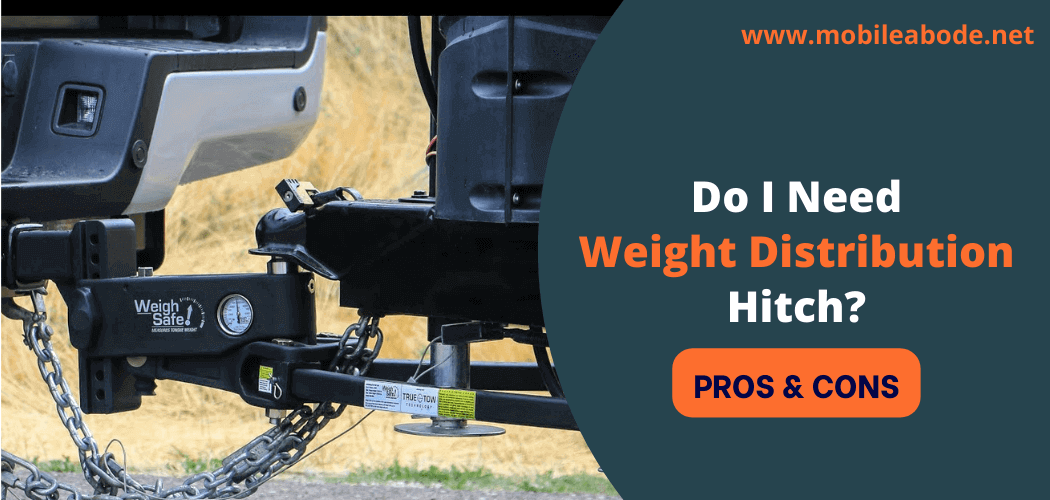When it comes to towing a trailer, there are a lot of different things that you need to consider to make sure that the process goes as smoothly as possible. One of the most important factors is making sure that your tow vehicle and trailer are properly balanced.
A weight distribution hitch can help to achieve this balance by evenly distributing the weight of the trailer across the tow vehicle’s axle.
In this post, we’ll take a look at what a weight distribution hitch does and when you might need one. We’ll also discuss some of the pros and cons of using one.
By the end, you should have a good idea of whether or not you need a weight distribution hitch for your next tow.
What is Weight Distribution Hitch & How Does It Work?
A weight distribution hitch is a device that helps to evenly distribute the weight of a trailer across the axle of a tow vehicle. This distribution of weight helps to improve the stability and handling of the vehicle, making it easier to tow.
There are two main types of weight distribution hitches: those with springs and those without.
Spring-loaded hitches use a system of springs to distribute the weight of the trailer across the axle. These hitches are typically used for lighter trailers and can be easier to install than other types of hitches.
Hitches without springs rely on the weight of the trailer itself to distribute the weight across the axle. These hitches are typically used for heavier trailers and can provide a more stable tow.
When Do You Need a Weight Distribution Hitch?
A weight distribution hitch is not required for every trailer, but there are certain circumstances when it might be a good idea to use one.
There are a few conditions when you might need to use a weight distribution hitch.
- One situation is when you’re carrying a heavy load with your trailer. Then distributing that weight evenly will help to improve stability and better handling.
- Another circumstance when you might need to use a weight-distribution hitch is when the trailer is unbalanced. Then a hitch can help to weigh evenly and improve stability.
- Finally, you might need to use a weight-distribution hitch if your tow vehicle is having trouble handling the trailer. If the trailer is causing the tow vehicle to veer off course or fishtail, distributing the weight evenly can help to alleviate these issues.
Pros & Cons of Using Weight Distribution Hitch
There are both pros and cons to using a weight distribution hitch. Some of the benefits include improved stability and handling, easier towing and decreased wear and tear on your tow vehicle.
1) Improved stability and handling
The main advantage of using a weight distribution hitch is that it helps to improve the stability and handling of your tow vehicle. By distributing the weight of the trailer evenly, the hitch can help to alleviate issues like fishtailing and veering off course.
2) Decreased wear and tear
In addition, distributing the weight evenly can help to reduce wear and tear on your tow vehicle. When a trailer is unbalanced or carrying a heavy load, it puts extra strain on the axle, tires and suspension of the vehicle. This extra strain can lead to premature wear and tear.
3) Easier towing
Another advantage of using a weight distribution hitch is that it can make towing easier. When the weight of the trailer is distributed evenly, it takes less work for the tow vehicle to pull the trailer. This can be especially helpful when you’re going up hills or over long distances.
Drawbacks of Using WDH
There are also some drawbacks to using a weight distribution hitch.
- One of the main disadvantages is that they can be more difficult to install than other types of hitches.
- Another downside is that they can be more expensive than other types of hitches. Some weight distribution hitches can cost 150$ to 1000$.
- Finally, weight distribution hitches can add extra weight to your tow vehicle. This extra weight can impact fuel efficiency and make it more difficult to maneuver the vehicle.
FAQs – Do I Need Weight Distribution Hitch
Does a 3000-pound trailer need a weight distribution hitch?
There is no definitive answer to this question, as it depends on a variety of factors.
If you’re carrying a heavy load with your trailer. The trailer is unbalanced. Ultimately, it’s up to you to decide whether or not you need a weight distribution hitch for your 3000-pound trailer.
How much weight does a weight distribution hitch reduce tongue weight?
Depends on the specific weight distribution hitch you’re using. Some hitches can reduce tongue weight by up to 50%.
It’s important to consult the instructions for your particular hitch to see how much weight it can reduce.
Wrap Up
There are a few key things to consider when deciding if you need a weight distribution hitch. The most important factor is the tongue weight of your trailer or camper. This is the amount of weight that presses down on the hitch ball.
If the tongue weight is more than 10-15% of the total trailer weight, then you will likely need a weight distribution hitch to keep the trailer from swaying side-to-side as you drive. Another thing to consider is how well your vehicle’s suspension can handle the extra load.
If it starts bouncing around too much with the added trailer weight, then you also need a weight distribution hitch.
There are many different types and styles available though, so take some time to research which would work best for your needs before making a purchase decision.

